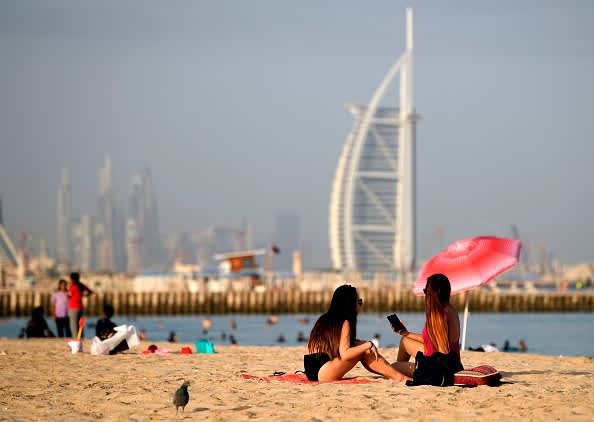Woman sunbathers sit along a beach in the Gulf emirate of Dubai on July 24, 2020, while behind is seen the Burj al-Arab hotel. After a painful four-month tourism shutdown that ended earlier in July, Dubai is billing itself as a safe destination with the resources to ward off coronavirus.
KARIM SAHIB | AFP via Getty Images
DUBAI, United Arab Emirates — While much of the world languished in full or partial coronavirus lockdowns this winter, under governments’ pleas to stay indoors, the Middle East’s leisure and commerce hub of Dubai has been welcoming tourists craving some semblance of normality to its balmy beaches and reopened restaurants, malls, amusement parks and hotels.
But the Gulf emirate of roughly 3.4 million, after a long stretch of low Covid-19 case counts, may be seeing clouds on the horizon. The U.K., one of Dubai’s largest sources of tourists, has taken the United Arab Emirates off its “safe travel corridor” in the wake of nearly a tripling of daily Covid cases in the country within the span of two weeks from late December. That means that travelers returning from the UAE to England, Scotland, Wales and Northern Ireland are required to self-isolate for 10 days starting Tuesday.
“The LATEST data indicates we need to immediately remove the #UAE from the #TRAVELCORRIDOR list,” U.K. Transport Secretary Grant Shapps tweeted late evening on Monday. “From 0400 Tuesday 12 Jan anyone arriving from the UAE will need to SELF-ISOLATE.”
To date, the UAE has registered roughly 233,000 Covid cases and 711 deaths since the pandemic began. The latest case count average for the last week was 2,607.
The U.K., among the countries hardest-hit by the virus in Europe and 5th-highest in the world in terms of both cases and deaths, has registered 3.12 million cases and more than 82,000 deaths.
A bubble of relative normality
After imposing one of the strictest lockdowns in the world in March and April of 2020, Dubai’s economy began to gradually reopen, even while its neighbor and UAE capital Abu Dhabi stayed largely closed. It started receiving tourists again on July 7, and in recent months has seen the tourism sector — which normally accounts for some 12% of Dubai’s GDP — reflect a relatively healthy recovery.
It also capitalized on its openness and “Safe Travel” certification by launching a remote worker visa program, and its signing of the Abraham Accords in August has brought in a growing stream of first-time visitors from Israel. Rental and hotel prices have jumped over the winter months. Dubai’s restaurants and bars were bustling with activity and authorities allowed private gatherings of up to 30 people during the New Year celebrations.
The irony of the U.K. move is not lost on some Dubai residents. Brits flooded Dubai resorts to escape the harsh U.K. winter lockdown, triggered by the discovery of a rapidly spreading new coronavirus strain that’s been found to be 70% more transmissible than its predecessor.
‘The cases are ridiculous’
British social media influencers and celebrities flocked to Dubai’s famous nightclubs and beaches, posting bikini-clad selfies on Instagram as dozens of countries imposed bans on U.K. travelers for fear of the new virus variant.
“They sent all their Covid cases to us and now they’re telling their citizens that the UAE is unsafe to travel to! You have to be joking,” one Dubai resident told CNBC.
“Good riddance, the cases are ridiculous,” another Dubai resident said of the U.K. visitors.
The UAE’s Foreign Ministry declined to respond to a CNBC request for comment. The U.K.’s Transport Ministry did not reply to a CNBC comment request at time of writing.
Dubai has made a show of its efforts to uphold Covid safety best (best safety?) practices; masks are required in all public venues, workers can be seen sanitizing public areas constantly, and markers indicating safe distances are ubiquitous. Negative coronavirus tests are required for entry from some countries before boarding, while others travelers — like those from the U.K. — have been allowed to get PCR tests on arrival at Dubai airport.
The UAE also benefits from an overwhelmingly young population, since the 90% expat population on which much of its economy depends cannot retire in the country. That helps explain why its virus death count is so relatively low.
Coronavirus tests are readily available and the country is rapidly rolling out its vaccination campaign, offering all residents both the Pfizer-BioNTech vaccine and China’s Sinopharm vaccine for free, with Moderna’s vaccine soon to join that list. The speed of its inoculation campaign is second only to Israel’s, experts say.
But amid the boom in visitors and the new virus strain ripping through more than 40 countries to date, many in the UAE believe it was only a matter of time before Dubai’s Covid-safe bubble was popped.
The U.K., by contrast, has not required any proof of health or a negative Covid test result for arrivals since the pandemic began. Travelers to the country describe not even being questioned or having their temperature taken on arrival in U.K. airports.
It will begin requiring negative tests for international arrivals, taken within 72 hours of departure, for the first time from Jan. 15, the U.K.’s transport ministry said this week.
